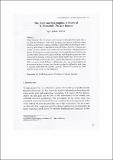PUC Institutional Repository
Sin, Guilt and Redemption: A Study of K.Hosseini's The Kite Runner
JavaScript is disabled for your browser. Some features of this site may not work without it.
| dc.contributor.author | Uddin, Syed Jashim | |
| dc.date.accessioned | 2022-01-09T05:03:57Z | |
| dc.date.available | 2022-01-09T05:03:57Z | |
| dc.date.issued | 2019-12 | |
| dc.identifier.issn | 2075-650X | |
| dc.identifier.uri | http://digitalarchives.puc.ac.bd:8080/xmlui/handle/123456789/93 | |
| dc.description.abstract | Khaled Hosseini's The Kite Runner can be evaluated in the light of theological ideas of sin, guilt and redemption. In the novel, the protagonist commits sin by undertaking activities contrary to the morally sanctioned principles which eventually give birth to a sense of guilt in him for which later, he seeks redemption. Amir, the protagonist, can be taken as a sinner considering his unfair and unjust treatment to his boyhood friend Hassan. He violates the parameters of reciprocal relationship between friends when he overlooks rape of Hassan by the gang and brings theft-allegation against him. After coming back to Pakistan to visit his father's friend Rahim Khan, he discovers that Hassan is Iris half-brother. He also comes to know about Hassan's son, Sohrab, who is held as a captive by the Talibans in Afghanistan. As a way of compensating the maltreatment he does to Hassan, Amir decides to go back to Afghanistan with a view to rescuing Sohrab from the Taliban's captivity. This article examines how Amir commits sin and how he gets his redemption. | en_US |
| dc.language.iso | en_US | en_US |
| dc.publisher | Premier University, Chattogram | en_US |
| dc.relation.ispartofseries | Premier Critical Perspective;Vol. 4, Issue 1, December 2019, P. 25-35 | |
| dc.subject | Sin, Guilt, Redemption, Confession, God and Sacrifice. | en_US |
| dc.title | Sin, Guilt and Redemption: A Study of K.Hosseini's The Kite Runner | en_US |
| dc.type | Article | en_US |
